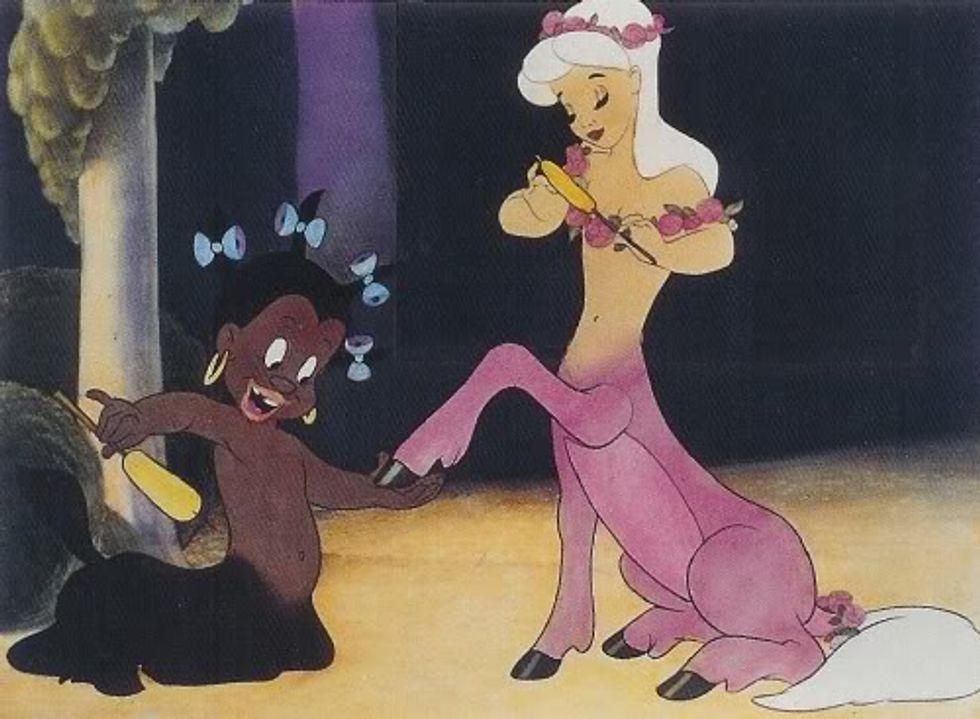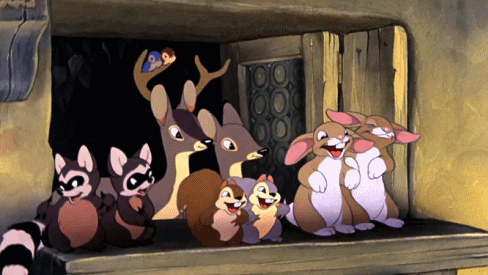I think we can all agree we grew up with Disney at some point in our lives and we all wanted to be the princess who falls in love, gets the prince and sees her dream come true.
But to be honest, I have sincerely reached the point where I have outgrown Disney. Everyone's excited about the latest installment of the live-action Beauty and the Beast adaptation (with an astounding performance by actress and feminist, Emma Watson), which frankly is nothing more than a reproduction of the animated version. While there's a lot of hype surrounding the latest Disney movies, like Moana or the live action adaptation of The Jungle Book, I am not excited about Disney's new projects.
Call me anti-Disney, but the franchise's movies don't fascinate me anymore. While many individuals hold Disney very close to their heart, I think it's necessary to know that Disney is not as glamorous as it seems for the following reasons.
1. The Disney Franchise
Many of us have heard the phrase, "opening up the Disney vault", and there's a reason why. Walt Disney, the man who created Mickey Mouse, was first and foremost a businessman.
According to Jack Zipes in his article, "Breaking the Disney Spell," in From Mouse to Mermaid: "[Walt] Disney employed the most up-to-date technological means and used his own 'American' grit and ingenuity to appropriate European fairy tales. His technical skills and ideological proclivities were so consummate that his signature has obscured the names of Charles Perrault, the Brothers Grimm, Hans Christian Andersen, and Carlo Collodi. If children or adults think of the great classical fairy tales today, be it Snow White, Sleeping Beauty, or Cinderella, they will think Walt Disney. Their first and perhaps lasting impressions of these tales and others will have emanated from a Disney film, book, or artifact".
Zipes additionally begs the question, "Did Disney achieve a complete monopoly on the fairy tale during his lifetime? Did he imprint a particular American vision on the fairy tale through his animated films that dominates our perspective today? And, if he did manage to cast his mass-mediated spell on the fairy tale so that we see and rad the classical tales through his lens, is that so terrible?"
In response to Zipes, I would say yes. Walt Disney was a radical filmmaker who changed our way of viewing fairy tales, very effectively too if I might add, and in so doing created an American monopoly on fairy tales, most of which were borrowed from other folklorists and oral traditional fairy stories and whose meanings were changed to fit Disney's own agenda. Some of the traditional fairy stories are meant to be cautionary tales about the real world or real life issues-although not directly but subtly. Take Red Riding Hood for example. Although, there have been multiple versions of the tale, it is still at its core a cautionary tale about not putting your trust in strangers.
According to Brenda Ayres' "The Wonderful World of Disney: The World That Made the Man and the Man That Made the World", "Disney exerted more power to promote an American ideal than anyone else alive at the time. What American child, regardless of religion, sex, culture, language, economic class, or geography, did not watch a Disney cartoon?" (17). Ayres' chapter as part of her larger work, The Emperor's Old Groove: Decolonizing Disney's Magic Kingdom, is aimed directly to "identify in what ways Disney's version of children's fairy tales reinforce a mythological notion of American 'beauty, joy, and truth,' to borrow Lyndon B. Johnson's praise of Disney's work. These are qualities that the U.S. president deemed immortal. However, a system of values--with its signifiers of beauty, joy, and truth--is neither fixed nor immutable, but is determined by those who have the power to define and propagate it" (18).
"Disney projected himself as a simple, down-on-the-farm, Midwestern commonsensical, and Yankee-know-how kind of fellow," states Ayres, "who had nothing to do with deeper intellectual sensibilities or a political agenda--It is that Midwestern image--white, middle class, all-American, apple pie, Bible on the coffee table, anti-intellectual, heterosexual nuclear family--that has come to form the Disney ideal. Disney products colonize generations of children and parents to embrace this ideal and to regard divergence as inferior of evil. The Disneyfication of our children, then, is empire building, complete with an imperialistic colonizing force that effects either conformity to the ideal or denigration of the Other" (16).
"'I feel that everybody in my studio is one hundred per cent American", Walt Disney once assured to a committee. "'He was on his way to becoming 'Uncle Walt,'" asserts Anthony Lane in his work, "The Case Against Disney" from "What Walt Disney Made", "that figure of faintly sinister geniality who bestrode the postwar scene. The joshing, scruffy Disney who used to sprinkle enthusiasm, like fairy dust or fever, upon his willing employees grew both touchy and untouchable. According to Eliot, he shot footage of Kirk Douglas and his sons Michael and Joel as they rode a miniature train around the Disney household, and spliced it into an episode of 'Disneyland' without permissions; Douglas took legal action but dropped the suit. 'You can't sue God,' he remarked. By this stage, Disney's career was a glare of fame and wealth" (75). This image of Disney as a God plays into effect when you look at things like Disneyland, "Opening up the Disney fault", from Walt Disney's studios, Disney Musicals (The Lion King, Tarzan, The Little Mermaid) and live-action movie adaptations. Disney is definitely not God, only a creator, an imitator. When artists make the assertion that they are somehow God or like God, I think it's a huge hubris problem. Yes, the power to create stories and become a story-teller is godlike, but we create things because we are inspired by others. Sometimes our stories are original but sometimes we imitate and get our inspiration from others. To draw one particular example, which fantasy writer have you not heard of, that hasn't borrowed his or her inspiration from J.R.R. Tolkien's The Lord of the Rings?
Disney is no exception. He got his inspiration from fairy tales, such as Hans Christian Anderson, and unfortunately, Disney as a company gets more credit than the original tales.
2. History of Gender and Racial Biases
Ayres maintains that there has been "evidence of religious, racial, and gender biases in Disney's business dealings and creative production attests to the man's political involvement. He knew how to use the power gained from his studios to 'Disneyfy' others, that is, to impose his own values on those within the reach of his power" (16). Now arguably, Disney has improved over the years in terms of overcoming race and gender biases as seen in Moana, The Princess and the Frog and Zootopia, there is still a lot of room for change throughout the franchise's history.
"His growing up there (Midwest)" claims Ayres, "might be reason alone to warrant the image of Disney as the consummate American whose films could be trusted to be as wholesome as apple pie. Presumably the Midwest, the heartland, is as American as America gets. Ironically, the Disney family resided in a city that was a hotbed of racism. It would not be fair to assume that just because Kansas City was notorious for racial bigotry, Disney was likewise. However, Disney's perpetuation of unflattering black stereotypes throughout his cartoons is equally as notorious. In fact, the Interracial Film and Racial Guild attacked just such racism in Song of the South" (20)
Not only that, but there's been evidence of racism as seen in Dumbo (the crow named Jim Crow allegedly named after the infamous segregation laws), Peter Pan ("What Makes the Red Man Red?"-intended to be a light-hearted song about learning who the Native Americans are, only to reinforce highly-offensive stereotypes) and Fantasia as seen in Sunflower the Centaur (Sunflower being a small black centaur girl with over-sized lips, acting as a servant to the thin, beautiful and white female centaur, Otika).
"Disney's version of truth is the message of a colonizer," says Ayres, "Mine is the only acceptable culture and you will assimilate. At the center of my culture is the white, middle-class, American, Protestant, conservative nuclear family, with clearly defined and separate gender roles performed by a heterosexual couple, committed to raising their children in the same mold. Deviant behavior will be construed as truly evil" (18).
Through the years, the value of heroines, such as Snow White and Sleeping Beauty, were focused on staying quiet and invisible. In the process of the Disney enterprise, the stereotype has changed from being the quiet, submissive damsel in distress to being the princess/savior of the day who's still reliant on a man (take Ariel or Anna from Frozen, for example).
"These are the stereoypes that are being passed on to our children as proper behavior types," argues Ayres, "For decades, audiences have allowed Disney to dictate gender norms, and they have also entrusted him and his company to dictate cultural norms, accepting that 'Made in America' is best" (19). And if you don't think Disney is still reinforcing its dictation over gender norms, just like look at the live adaption of Beauty and the Beast (Belle still gets the Prince) and Moana , who's main heroine maintains that she's not a damsel in distress during her journey.
"Another telling detail about Disney's life," maintains Ayres, "that indexed his adherence to radical right-wing fundamentalism was the public ridicule he directed at one of his most talented staffers, Art Babbitt. This animator was working on Fantasia and decided to take piano lessons at his own expense to help better understand the integration of music with art in this film. When Disney learned of this, according to Eliot, he said to the employee, 'Well, what the hell's the matter with you; are you some kind of faggot?' and 'fag,' according to Schickel. This is a revealing signifier of a value system held by a man who powerfully defined the value system for America" (22). That's a bit of extreme biasness, even for Disney. So when you hope to see the next film about a transgender princess or see tweets about LeFou being gay (God forbid! Close your eyes conservatives!), keep this in mind for the man who started the monopolizing company that is 'revolutionary'.
3. Phony Realism
Anthony Lane, asserted in "The Case Against Disney" that "Vincent Scully wrote in Life, in 1965, that 'Disney caters to the kind of phony reality that we all too readily accept in place of the true. Mr. Disney, I'm afraid, has our number.' Scully was discussing architecture, but you can imagine his terms of indictment being applied to almost any practice of the present day, starting with television and political spin--All the conflicts of the real world, the nerve centers of bourgeois society, are purified in the imagination in order to be absorbed and co-opted into the world of entertainment" (74).
It's a formulaic pattern within Disney movies to have talking animals, princesses, villains and more. Granted, this has changed somewhat but for the most part they remain, using Frozen or Moana as evidence.
According to Lane, Disney once said, "'I have no recollection of ever being unhappy in my life,' That is both wishful thinking and bad remembering" (75). Not only that, but it is also blatant hypocrisy on his part.
According to Brenda Ayres, "As much as his films politicize the American family, they also reflect Disney's psychological makeup. His father was a severe man who literally wielded the strap freely and cruelly. In addition, he exploited his sons as free labor. The biographers tend to agree that Disney felt a lack of love and acceptance from his father, and that this is the reason that in such films as Pinocchio, Peter Pan, and Mary Poppins, children search for an effective father--Driven by his own hunger for familial security, Disney's recurrent theme was 'the sanctity of family and the tragic consequences when that sanctity was broken--striving for the ideal family and prioritizing family seemed to be Disney's impetus throughout his life. Separation anxiety, Bruno Bettelheim reasons, is one of the major childhood concerns that fairy tales address" (20-21).
Such a subject is touched briefly upon in the film, Saving Mr. Banks, when Walt begs for the return of one of his employees. "I'm just so tired, Ms. Travers. I'm tired of remembering it that way. We all have our sad tales but don't you want to finish the story, let it all go, have a life that isn't dictated by the past. Life is a harsh sentence to lay down for yourself". If it's a happy ending that Walt's looking for, grow up, face the facts. Life isn't fair. Sorry to break it to you. But that's just how it is. If I wanted to hear a story about how life isn't fair I'd look at Game of Thrones, Into the Woods and Lord of the Rings. None of the characters get their happy endings, it doesn't end up fair for them. But they solve it and for the most part it turns out bittersweet. It isn't perfect but it's the best they can resolve for.
"It is what most viewers want to believe," asserts Lane, "But just like the real world, fantasy is riddled with anxieties. How could it be otherwise, considering its creator? When one turns on the Disney Channel, Tinkerbell, as she has for decades, taps the castle with her magic wand, and then the world explodes into color. Looking at only the pretty colors in a Disney animated film can be deceptive" (23). If Walt really wanted to show a happy ending, at least a powerful one, he'd actually consider the real fairy tales you know the gruesome ones with gory details where some of the characters don't get their ever-afters like the children in Hansel and Gretel, the Evil Queen in Snow White who dances in hot-red shoes and the stepsisters in Cinderella who have their toes cut off for trying to look pretty and their eyes peeked out. Life throws difficulties at them but they overcome it and make the best out of life even if it's bittersweet. Although the intended audience is meant for children it's meant to show them subtlety that life throws difficulties at them, but can still overcome it.
"Many people do not want to know that there was a dark side to the man who lionized childhood," says Ayres, "They want to take their children to a Disney movie with the unquestioning assurance that Disney values are just what the world needs in order to better all lives" (22).
In my opinion, the world does not need Disney values or another billionaire story who made his success through a history of entrepreneur, monopolization, racism, misogyny, dominating gender values and flat-out phony realisms.





















